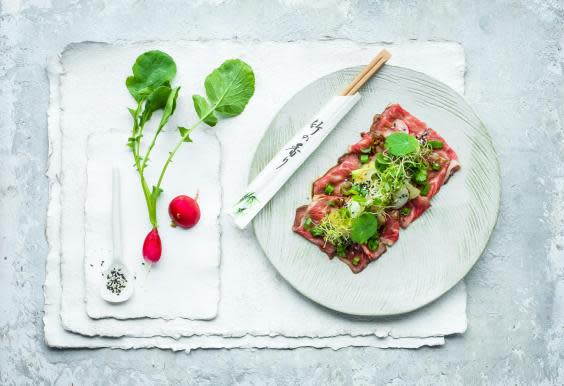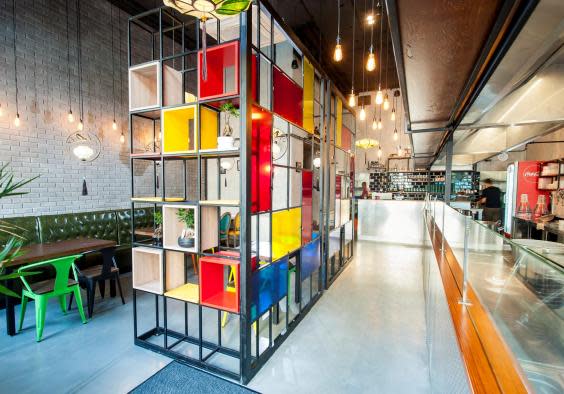Why Budapest has great Chinese food
“Budapest is one of the world’s most beautiful cities and a lot of people didn’t know that for a long time,” restaurateur Wang Qiang, better known as Master Wang, tells me. “Now there are more tourists. Thoughts about the city are changing and so are locals’ thoughts about Chinese food. There is more curiosity.” We are at his eponymous restaurant in Budapest’s 14th District, a largely residential area not far from the park Varosliget. Soon it will be time for dinner, when customers, a mix of Asians and Hungarians, start making their way in for crispy chilli shrimp, “Heaven and Earth” ribs and, if they had the foresight to order in advance, Peking duck.
Wang moved to Budapest nearly 30 years ago, and for more than a decade has opened restaurants that put well-made classic Chinese dishes in the limelight. His latest contribution to the city is Biang Bisztro, an upbeat eatery with locations near Oktogon and Fovam ter – I prefer the latter because it’s more spacious and conveniently next door to grocery store Azsia Diszkont for impulse chilli oil purchases – which reflects the growing penchant for Chinese food among Budapest residents.
“A lot of friends asked me why I hadn’t yet offered street food, so I decided it was time to show a different side of Chinese cooking that wasn’t too expensive,” says Wang. His signature restaurant is elegant, with scalloped chairs, caged light fixtures and wallpaper strewn with Chinese characters. Biang, by contrast, has a more urban vibe, with seating in cheerful hues, dangling pendants and whimsical artwork. This contemporary approach seems to resonate with diners.
Whether it’s served in a no-frills joint or a lustrous dining room, this cuisine is gaining momentum in the city.
The perpetually busy Momotaro, a dark, moody Chinese restaurant perfectly positioned for post-Danube River strolls and visits to the Hungarian Parliament Building, turns out a reliable line-up of sparerib ramen, spring onion pancakes and satisfyingly messy pork soup dumplings. Meanwhile, over at Hange, a 10-minute walk from the Mupa Budapest performing arts centre, business lunches unfold over chicken smothered in red chillis and beansprout-laden strips of lamb.

At the Four Seasons Hotel Gresham Palace Budapest, diners head to upscale Kollazs for escargot and red snapper. Or they’re in the low-key Lobby Bar, set underneath a dreamy glass cupola, which got a culinary reboot last summer and now serves a roster of comforting favourites like stir-fried rice and beef tartare with soy sauce.
“I’ve always loved Asian food. It’s flavourful and accessible, so it makes sense that more people in Budapest are discovering this cuisine and enjoying it,” says Arpad Gyorffy, the chef behind both concepts.
It’s a pan-Asian menu that translates to success for places like Sao, a rare bright spot in the raucous restaurant and bar-filled Gozsdu Udvar complex that is packed nightly for caramelised pork summer rolls and wok-fried pak choi. Its newer sibling Khan, in a sleepy part of the charming 13th District, is just as fashionable, with enthusiastic diners nibbling on sweet potato tempura and twirling dandan noodles surrounded by zen greenery and mesh chandeliers.

This growing interest in Chinese food has been a long time coming. Budapest has a robust Chinese population, tracing its Hungarian roots to just before the fall of Communism in 1989, when Hungary relaxed visa rules for Chinese citizens. A particularly tumultuous era marked by events like the Tiananmen Square protests in Beijing made Hungary all the more alluring to the Chinese, so many came running, helping build an impressive post-socialist Central and East European hub of commercial Chinese goods in the process.
You’ll find Budapest’s best Chinese food in Kobanya, Budapest’s shabby, working-class 10th District, a half-hour bus ride from the centre. The Monori Center is a sprawling Chinese wholesale mecca of warehouses, selling denim, scarves, ties – and Chinese food.
This is Budapest’s unofficial Chinatown, peppered with quality sit-down restaurants serving homespun dishes from China’s disparate regions. The flavours here are bold with spice and not tamed for Western palates. Typically, little English is spoken.

Slurping a bowl of congee at Hong Kong Bufe, for instance, is a morning ritual for many of Monori Center’s workers. In the afternoons and evenings, hand-pulled noodles and black pepper beef beckon at the Sichuan-centric He He, as does the sweet and sour pork at Shandong. During the summer, the Chinatown Night Market arrives here, bringing with it the energy of a zippy Asian marketplace, animated with street vendors offering cumin spiced lamb chops, cabbage with crisp pork belly and sauteed long beans.
Tas Tobias, the Budapest native behind Offbeat Budapest, loves visiting the Monori Center. “I know locals in Budapest who have visited Chinatown in New York and London yet aren’t even aware there’s one here,” he says. “Monori Center doesn’t outwardly present itself the way many other Chinatowns do. There are no pagoda-shaped buildings or Chinese lanterns here to draw tourists, and I think that’s why it has remained under the radar for most people. But that’s also why it feels so authentic. And the restaurants are swarming with Chinese customers during the day, which is of course a good sign for a Chinese restaurant.”
Whether it’s fried dumplings at Dabao Jiaozi, gathering around a table for shrimp noodles at Milky Way or devouring mapo tofu at bright, brick-walled Spicy Fish, visiting the Monori Center is a worthwhile detour.
Travel essentials
Ryanair flies to Budapest from London Stansted from £36 return.









